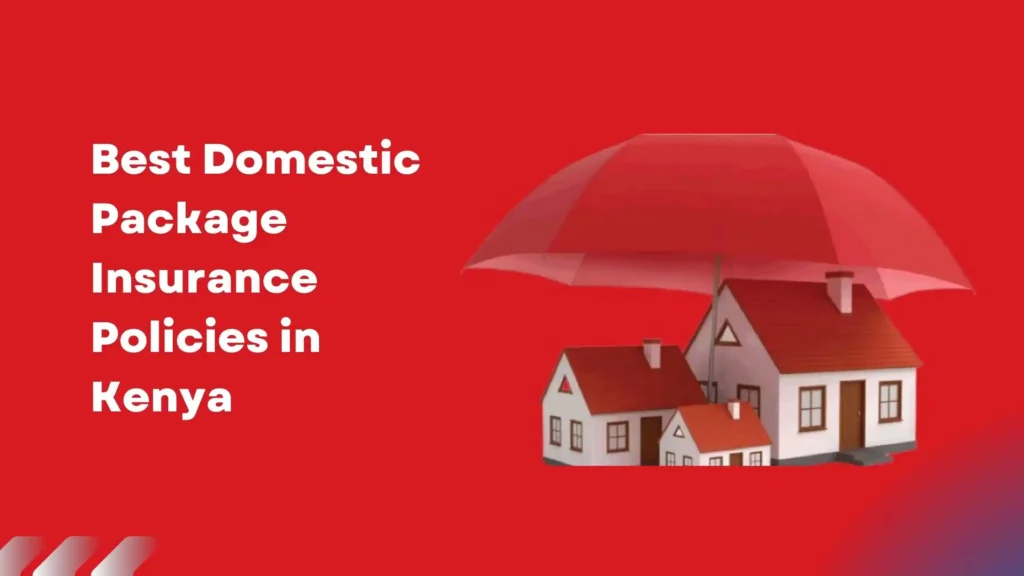Secure Your Home: Domestic Package Insurance Policies in Kenya
- Introduction
- Understanding Domestic Package Insurance in Kenya
- Types of Domestic Package Insurance
- Top Considerations When Choosing a Domestic Package Insurance Policy
- Underwriting Considerations for Domestic Package Insurance in Kenya
- Tips for Getting the Best Deal on Domestic Package Insurance in Kenya
- The Claims Process for Domestic Package Insurance in Kenya
- Conclusion
- Frequently Asked Questions
- Read Also
Introduction
Domestic package insurance serves as a comprehensive safeguard for homes and their contents. Consolidating various coverages into a singular policy for enhanced protection against unforeseen risks.
In Kenya, the necessity of such insurance cannot be overstated. Property crime rates are a big worry in many areas. They threaten homeowners’ assets. Also, our country is prone to natural disasters. These include floods and fires. They can quickly damage properties and belongings.
Without domestic package insurance, people face high costs after property loss or damage. This can result from crimes or natural disasters. By getting this insurance, homeowners lower these risks. They gain financial security and peace of mind.
Domestic package insurance is a smart choice. It boosts protection and resilience, a key part of home risk management. With this insurance, homeowners can face unexpected challenges. They do so with confidence. They know they have a strong safety net. It helps them reduce losses and recover easily.
When choosing a domestic package insurance policy, consider factors like :
- The coverage offered
- The cost of the policy
- Deductibles you might have to pay.
Understanding Domestic Package Insurance in Kenya
Insurance for domestic packages in Kenya usually covers key areas. It protects your home and belongings.
- Building Structure: Your home’s structure has walls, roofs, and fixtures. If damaged by fire, storms, or other events, insurance will pay for repairs or rebuilding.
- Contents: This policy covers your home’s contents. It includes furniture, electronics, and personal items. It replaces stolen or damaged items.
- Personal Liability: This protects you. It’s if someone is hurt on your property and sues. It covers legal costs and any compensation you might have to pay.
- Additional Benefits: Some policies offer extra coverage, such as insurance for domestic staff. This can cover medical expenses. It also covers compensation if your house help gets injured while working.
Types of Domestic Package Insurance
There are generally two types of domestic package insurance available:

- Basic Policies: These offer essential coverage for the building structure and contents. They are usually more affordable but may have limited benefits.
- Comprehensive Policies: They cover more things. This includes personal liability and extra benefits. For example, domestic staff insurance. They offer more protection but might be more expensive.
Top Considerations When Choosing a Domestic Package Insurance Policy
1. Coverage
When picking home insurance, start by knowing your needs. Then, check if the policy meets them. Think about the value of your belongings, such as furniture and electronics. Also, consider natural disasters like floods or earthquakes. Make sure the policy covers these. Good coverage protects your home and belongings financially.
2. Cost
Several factors influence the cost of your insurance policy:
- Location: Homes in risky areas have higher premiums. These areas are prone to disasters or have high crime rates.
- Value of Insured Items: The more valuable your belongings are. Higher premiums mean higher costs. Deductibles are what you pay upfront before insurance helps. Plans with high deductibles have lower premiums. However, you will pay more when you make a claim.
Understanding these factors helps you choose a policy that fits your budget. It will also provide the coverage you need.
3. Reputation and Customer Service
Check the insurance company’s reputation for claim settlements and service. Look for customer reviews and ratings. A company with a good reputation and top service can simplify the claims process. It also reduces your stress. Moreover, reliable companies process your claims quickly and fairly.
4. Renewal Rates
Be cautious of renewal rate increases. Some insurers offer low starting prices but raise them a lot later. So, check their history. Steady, fair rates can save you money and avoid surprises.
Underwriting Considerations for Domestic Package Insurance in Kenya
1. Insured’s Risk Profile
- Claims History: This is your past record of insurance claims. If you’ve made many claims, the company might raise your rates or deny coverage.
- Security Measures: Safety features in your home. They include burglar alarms, security bars, and a safe neighborhood. Better security can lower insurance costs.
- Occupancy: Your job can impact your insurance. For instance, jobs as a firefighter or security guard are risky. If you have one of these jobs and your home is often empty, your insurance costs might rise.
2. Property Characteristics
- Location: High-crime areas raise insurance costs. The same goes for disaster-prone areas.
- Building Type and Construction: The materials used to construct your home affect your insurance. For example, brick is better than wood. Durable materials mean lower costs.
- Value of Contents: The value of everything inside your home is important. A more expensive inventory means higher insurance costs. It’s important to provide an accurate list of your belongings.
3. Policy Coverage and Limits
- Sum Insured: It’s the total insurance amount for your home and belongings. More cover Policy Coverage and Limits rage means higher costs.
- Specific Risks Covered: Each policy covers different risks. These include fire, theft, and natural disasters. Adding more coverage options will increase the cost.
- Policy Excess: This is the amount you pay upfront before your insurance covers a claim. Picking a higher deductible reduces your insurance costs. However, you’ll have to pay more if an incident occurs.
Always be honest and clear with your insurance company. This allows them to assess risks and set a fair premium. Providing false or incomplete information might raise costs or lead to denied claims. Thus, accuracy is crucial.
Tips for Getting the Best Deal on Domestic Package Insurance in Kenya
- Compare quotes.
- Understand your needs.
- Bundle policies.
- Review coverage limits.
- Ask about discounts.
- Maintain a good credit score.
- Review policy annually.
- Consider the reputation of the insurance company.
The Claims Process for Domestic Package Insurance in Kenya
1. Report the Incident
- Act Quickly: Contact your insurance company right after a covered event. Covered events include fire, theft, etc. Most insurers have 24/7 hotlines. They also have online options for reporting claims.
- Be Prepared: Have details ready. Include the date, time, and a brief description of the incident.
2. Gather Documentation
- Support Your Claim: Collect relevant documents to strengthen your claim. These might include:
- Police reports: For theft, vandalism, or other incidents involving a crime.
- Fire reports: If your claim is related to a fire.
- Receipts or invoices: For damaged or stolen items (proof of value).
- Photographs: Visual documentation of the damage to your property.
3. Submit Your Claim
- Complete the Forms: Fill out the claim forms provided by your insurance company.
- Attach Documentation: Ensure all gathered documents are attached to your claim form.
- Submit Your Claim: Submit the form electronically. Or, bring it to the insurer’s offices.
4. Claim Assessment
- Investigation Time: An insurance adjuster will check your claim. They may visit your property or ask for more details.
5. Claim Settlement
- Review and Decision: The adjuster will review your claim and documents. They will see if it’s covered by your policy.
- Payout Process: IIf approved, you’ll get a payout. It will be based on your coverage limits and policy terms.
Tips for a Smooth Claims Process
- Report the incident and file your claim as soon as possible to avoid delays.
- Give clear and full information. This will prevent issues in claim assessment.
- Stay in touch with your insurance provider. Check on the status of your claim and provide more info if asked.
Conclusion
To find the best home insurance in Kenya, follow these steps. First, compare prices from different providers. This helps you find competitive rates and a policy that suits your budget with good coverage. Look for special deals and discounts. Bundling insurances or staying claims-free might get you significant discounts. This saves money on premiums.
- First, consider your needs. Do you need home structure coverage or also coverage for belongings?
- Customize your policy to avoid extra costs.
- Then, check the insurance company’s reputation. Reviews and recommendations help.
- Read the insurance plan’s terms before signing. This will prepare you for surprises and ensure you get the right protection.

